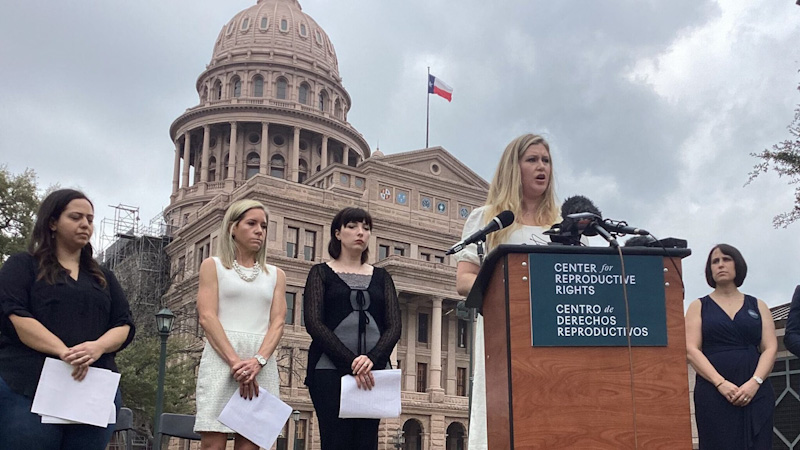Judges can't expand narrow exception to abortion ban 'under the guise of interpreting it,' Texas Supreme Court says

At a press conference on March 7 in Austin, Texas, Lauren Miller (at the podium) and other plaintiffs in a Texas lawsuit that is still pending spoke about their experiences facing dangerous pregnancy complications and being denied abortion care. Photo from the Center for Reproductive Rights’ March 7 press release.
A woman whose fetus has a genetic abnormality that is nearly always fatal cannot get an abortion in Texas because her doctor did not allege that the risks of her pregnancy met the state’s standard for an exception to its ban on abortions, the Texas Supreme Court ruled Monday.
The Texas Supreme Court cited Texas law, which allows an abortion when, based on reasonable medical judgment, the pregnant woman has “a life-threatening physical condition aggravated by, caused by or arising from a pregnancy that places the female at risk of death or poses a serious risk of substantial impairment of a major bodily function.”
The state supreme court ruled against the Dallas-area pregnant woman, Kate Cox, and overturned a Travis County, Texas, decision in her favor.
The New York Times, Reuters, Bloomberg Law and the Washington Post are among the publications with coverage.
Cox’s doctor, Dr. Damla Karsan, did not attest that Cox’s condition “poses the risks the exception requires,” the state supreme court said. Karsan had alleged a “good-faith belief” that Cox met the Texas standard for an abortion, but that is not the same as “reasonable medical judgment,” the objective standard that is required.
“Judges do not have the authority to expand the statutory exception to reach abortions that do not fall within its text under the guise of interpreting it,” the Texas Supreme Court said.
But the state high court said the “reasonable medical judgment” standard “does not hold a doctor to medical certainty, nor does it cover only adverse results that will happen immediately absent an abortion, nor does it ask the doctor to wait until the mother is within an inch of death or her bodily impairment is fully manifest or practically irreversible. The exception does not mandate that a doctor in a true emergency await consultation with other doctors who may not be available. Rather, the exception is predicated on a doctor’s acting within the zone of reasonable medical judgment, which is what doctors do every day.”
The state supreme court suggested that the Texas Medical Board could provide more guidance regarding the standard “in response to any confusion that currently prevails.”
Cox, who is more than 20 weeks pregnant, has decided to get an abortion in a state where it is legal, according to the Center for Reproductive Rights, the group that represents her.
Cox said in an op-ed for the Dallas Morning News that her ability to have future children was at risk because she would probably need a cesarean section if she carried the pregnancy to term, the same operation that she had twice in the past when her two children were delivered.
Cox and her husband want one more child. The fetus has trisomy 18, which will result in a stillbirth or death soon after birth.
A separate abortion lawsuit, Zurawski v. Texas, is still pending in the state. The March 6 suit alleges that doctors in Texas are turning away pregnant women who face serious health risks and need abortions because the medical providers fear prosecution. Violating the Texas abortion ban could result in a sentence of life in prison.
The suit said a court should determine that physicians using their good-faith judgment may provide abortions to women with an emergent medical condition “that poses a risk of death or a risk to their health (including their fertility).”
Write a letter to the editor, share a story tip or update, or report an error.



